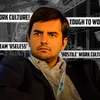Ola's Bhavish Aggarwal on his entrepreneurial journey, challenges with investors
In an interaction with YourStory Founder and CEO Shradha Sharma, Bhavish Aggarwal speaks about his journey, learnings, mentorship, and more.
Bhavish Aggarwal, the Co-founder of ride-hailing giant and EV startup , has always wanted to create impact from India for the world.
An IIT Mumbai graduate, Aggarwal worked at Microsoft for a couple of years before calling it quits. From starting ride-hailing aggregator Ola Cabs along with Ankit Bhati in 2011 to launching Ola Electric in 2017 and continuing to build both, Aggarwal has come a long way in the last 12 years.
Once a new entrant to the EV segment, Ola Electric now owns a 38% share in the market. It has sold more than 239,000 electric scooters since December 2021, according to data from the Society of Manufacturers of Electric Vehicles.
A purpose-driven entrepreneur, Aggarwal is also aligning his business goals in harmony with societal well-being. Ola Electric’s Futurefactory in Krishnagiri, Tamil Nadu, employs over 10,000 women. The 500-acre manufacturing facility, which has the capacity to produce 10 million electric scooters annually, is entirely driven by women.
The entrepreneur says that it is the only all-women automotive manufacturing facility globally. The reason behind making a women-only factory is that he wanted to enable women with economic opportunities that would improve not just their lives, but that of their families, and the whole community.
Entrepreneurial journey
According to Aggarwal, every entrepreneur’s journey is full of hardships. He says, the last 12 years have been full of hardships, but he was always prepared for it.
“I had all kinds of ups and downs. I met all kinds of people–sometimes clapping for me, and sometimes throwing stones at me. It does impact a lot. Everybody wants their work to be recognised. The intent behind the hard work that I personally put in is to truly create a change for society. However, when people try to pull you down, it hurts,” he adds.
Coming from a middle-class family, Aggarwal finds himself very lucky to have the value system he was given by his parents.
Speaking about his mentor, TVG Krishnamurthy, he says, “I have learnt so much from him about everything—professional life and personal life. I think I have accelerated my growth by 10 years at least just because he was there in my life.”
Learning from mistakes
Aggarwal believes in learning from mistakes. “I've made mistakes and I've learned from them. We have shut down businesses like the food business we did twice, and we learnt from it and decided not to do it. But once I believe in something, I will stand by it,” he says.
He also believes that social media puts up more scrutiny and that he has faced lots of naysayers in his journey.
“When we put out Ola Electric, people said we must have taken a shortcut and [asked] how we could launch so fast. And, with the scooter incident, people blamed us for not testing,” he recalls.
However, he claims that their scooters are the best-tested scooters in India with thorough R&D. The reason behind the incident was that it was launched for the first time, and hence, was bound to have issues.
“I’m not trying to whitewash these issues at all. It's not in my DNA to do that. I acknowledged my issues and I take them head-on,” says Aggarwal.
Investor-founder tussle
Aggarwal says he has been cognizant from day one of his entrepreneurial journey that the business has to be run in a way the founder decides.
“Sometimes, in the startup world, people presume that investors are mentors or gurus. However, I was cognizant from day one and always drew a boundary that investors are there to make money and we make sure they do make money.”
“I have always been very honest about my journey. And my journey was never about investors. It was never about the glamour of raising money. And we have had very good partnerships with investors, which continue, and we have raised a lot of money. But the end goal was not the investor,” he explains.
When asked about building a legacy, Aggarwal says, it’s too early as a founder to quote. However, Ola has been able to stand on its own against global competition in one domain and has been able to bring complete disruption in another domain. This is the extent of its legacy today.
“We're trying to build technology-oriented future businesses, which can have a large-scale global impact. So, hopefully, that becomes a legacy for us, but right now we are too early for it to be our existing legacy,” he adds.
Full interview to release on our Youtube Channel. Please subscribe and click on the bell icon to get notifications for updates.









